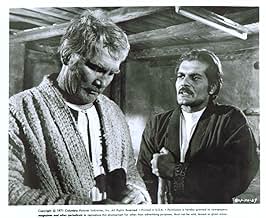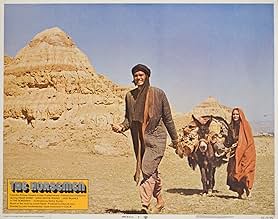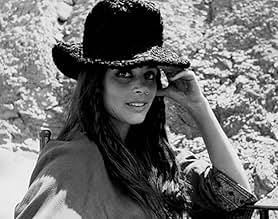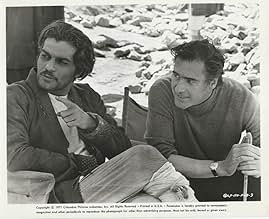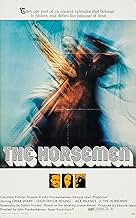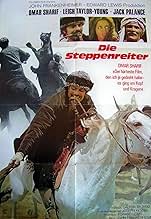VALUTAZIONE IMDb
6,2/10
1411
LA TUA VALUTAZIONE
Aggiungi una trama nella tua linguaDrama depicting rural life in contemporary Afghanistan and the Afghani people's love for an ancient traditional sport similar to horseback polo.Drama depicting rural life in contemporary Afghanistan and the Afghani people's love for an ancient traditional sport similar to horseback polo.Drama depicting rural life in contemporary Afghanistan and the Afghani people's love for an ancient traditional sport similar to horseback polo.
- Regia
- Sceneggiatura
- Star
Salmaan Peerzada
- Salih
- (as Salmaan Peer)
Aziz Resham
- Bacha to Ghulam
- (as Aziz Resh)
Vida St. Romaine
- Gypsy Woman
- (as Vida St Romaine)
Florencio Amarilla
- Arabian Man
- (non citato nei titoli originali)
Ishaq Bux
- Amjad Kahn
- (non citato nei titoli originali)
Carlos Casaravilla
- Messenger
- (non citato nei titoli originali)
Recensioni in evidenza
With a writer like Trumbo (who also did one of the best anti war movies of all time :"Johnny got his gun" )and a director like Frankenheimer ("the Manchurian candidate " "seconds" "birdman from Alcatraz" ,how could you be wrong?Add Omar Shariff and Jack Palance.Plus the marvelous wild landscapes .And the magic of these Asian nights.And however it does not quite make it.The slow-moving story is sometimes boring ,in spite of the talent of the actors (and the horses who play a prominent part ,check the title).The magnificence of the settings makes up for it but make sure you see it on a wide screen in a movie theater.Much of its appeal is inevitably lost on a tiny TV screen.
Omar Sharif and Jack Palance may be the only names in this cast that most will recognize but the story based on an Afghan tale, set in Afghanistan before the Russian invasion, is a classic tale which lays out a great deal of Afghan culture during the period before the great disruption by the West. Afghanistan returned to the public eye after the post-911 invasion to depose the Taliban but the state of knowledge about these marvelous independent people who fought the British Empire to a standstill, still remains obscure. The game of buzgashi, a kind of polo for Weidman, was the core for many of the tribesmen. Its importance as an institution marking the status of tribes and individuals has no real counterpart in Western culture, and this is a tale of intrigue and self-learning, framed in a cultural setting we still have yet to understand.
Spectacular movie with exciting adventures , horse-riding and marvelous Oriental landscapes in the desolate , poor northern provinces of the mountainous feudal Sunni kingdom of Afghanistan . The story is suitably emblematic and talks upon a champion Afghan horseman named Uraz (Omar Sharif) who participates with his horse in an extraordinary national game of "buzkashi" dating back to the time of Genghis Khan . It is a fierce competition, played on the steppes of the northern Afghanistan , before the Soviet-engineered republican revolutions . His father named Tursen (Jack Palance) is too old and has got a crooked leg , while Uraz is even prouder and with a morbidly self-destructive , he needs to prove himself against deadly dangers . Later on , he undertakes a risked journey to regain the honor he has lost after his defeat in the ceremonial game . On the journeys he loses a leg , is confronted by his servant (David Keyser) and an untouchable girl (Leigh Taylor Young) who want murder him , besides a nomad (Peter Jeffrey) who struggles his scraggy one-horned sheep . Each meeting has within the seeds of his own meaning and predicament . The final spectacle , including Omar Sharif's double , of the horseman along with his stallion is breathtaking and overwhelming.
This stirring motion picture blends adventures , thrills , spectacular horse-game , emotions and is pretty entertaining . From the beginning to the end , the adventure and drama is continuous ; for that reason packs a lot of entertainment , though it balances ups and downs . With a cast of thousands and genuine Afghan extras , being shot on actual locations . Sets and production design are spellbound and the Oriental landscapes are mesmerizing . It is based on Joseph Kessel's 1967 novel, "Les Cavaliers" ("The Horsemen"), Kessel spent almost fifty years of his life roaming the world and being adapted by the black-listed Dalton Trumbo . The film began shooting using 65mm negative (Super Panavision), but during production, Columbia went through a change in management. The budgets for this and another 65mm production, "MacKenna's Gold," were cut, and both films were forced to switch over to 35mm anamorphic Panavisión ; however, both were released in 70mm, with the later-shot sections blown up. Colorful cinematography by Claude Renoir filmed on location in Afghanistan and Almeria , Spain , where in the 60s and early 70s were filmed a lot of Westerns .Two/three weeks into shooting, cinematographer James Wong Howe left the Project , due to disagreement with director John Frankenheimer over use of lens. Sensitive and fascinating musical score by George Delerue .
The motion picture is compellingly directed by John Frankenheimer . At the beginning he worked for TV and turned to the cinema industry with The Young Stranger (1957) . Disappointed his with first feature film experience he came back to his successful television career directing a total of 152 live television shows in the 50s. He took another opportunity to change to the big screen , collaborating with Burt Lancaster in The Young Savages (1961) and Birdman of Alcatraz(62) ending up becoming a successful director well-known by his skills with actors and expressing on movies his views on important social deeds and philosophical events and film-making some classics as ¨The Manchurian candidate¨, ¨Seven days of May¨ and ¨The Train¨ . The flick will appeal to Oriental adventure enthusiasts and Omar Sharif fans . Rating: Good , well worth watching
This stirring motion picture blends adventures , thrills , spectacular horse-game , emotions and is pretty entertaining . From the beginning to the end , the adventure and drama is continuous ; for that reason packs a lot of entertainment , though it balances ups and downs . With a cast of thousands and genuine Afghan extras , being shot on actual locations . Sets and production design are spellbound and the Oriental landscapes are mesmerizing . It is based on Joseph Kessel's 1967 novel, "Les Cavaliers" ("The Horsemen"), Kessel spent almost fifty years of his life roaming the world and being adapted by the black-listed Dalton Trumbo . The film began shooting using 65mm negative (Super Panavision), but during production, Columbia went through a change in management. The budgets for this and another 65mm production, "MacKenna's Gold," were cut, and both films were forced to switch over to 35mm anamorphic Panavisión ; however, both were released in 70mm, with the later-shot sections blown up. Colorful cinematography by Claude Renoir filmed on location in Afghanistan and Almeria , Spain , where in the 60s and early 70s were filmed a lot of Westerns .Two/three weeks into shooting, cinematographer James Wong Howe left the Project , due to disagreement with director John Frankenheimer over use of lens. Sensitive and fascinating musical score by George Delerue .
The motion picture is compellingly directed by John Frankenheimer . At the beginning he worked for TV and turned to the cinema industry with The Young Stranger (1957) . Disappointed his with first feature film experience he came back to his successful television career directing a total of 152 live television shows in the 50s. He took another opportunity to change to the big screen , collaborating with Burt Lancaster in The Young Savages (1961) and Birdman of Alcatraz(62) ending up becoming a successful director well-known by his skills with actors and expressing on movies his views on important social deeds and philosophical events and film-making some classics as ¨The Manchurian candidate¨, ¨Seven days of May¨ and ¨The Train¨ . The flick will appeal to Oriental adventure enthusiasts and Omar Sharif fans . Rating: Good , well worth watching
This is a human condition action adventure that takes place in modern time( meaning 1971) Afghanistan. The film starts by showing how far back in time they are. Everybody is riding around on horses while planes are driving above them. In this country a proud (the best word would be prince but it doesn't exactly fit) Uraz (played by Omar Sharif, mostly known as that guy who had the lead in Doctor Zhivago) sets out to this weird horse tournament on the request of his father, a elderly clan leader and master of the sport played by the great Jack Palance.
It's made obvious from the start that though this man might be proud and even quite noble (he always bets on the weakest), he is in fact cruel to servants and have a rather nihilistic view on life. When he manages to fall off his horse and break his leg he feels a great dishonor and sets out to find the hardest and deadliest road home. On the way everything that is good in humans are questioned! The film has a very different view of the world than most others, at least this early in cinema. Many of the characters are so shady it will almost make you sick. I must say that I did not like these people as humans, though I did like their characters, inhuman behavior and cruelty is something I take a huge interest in. For those of you who enjoy to travel to different worlds and can enjoy and love films even if they perhaps have a different stand than your world view, this is the film for you.
I was quite taken by it I must say. My second favorite Frankenheimer picture to date, meaning that I thought it was better than great films such as The Manchurian Candidate, The Train and Seven Days in May. The colors are great and the mood and pacing is very intense. Most of the frames are quite beautiful. The acting is very good! And it's philosophy as a whole is rather good too but I will not give away anything about how this film turns out but I will say that I thought it was fabulous. A genius film! A masterpiece! You should definitely check it out. A true gem!
It's made obvious from the start that though this man might be proud and even quite noble (he always bets on the weakest), he is in fact cruel to servants and have a rather nihilistic view on life. When he manages to fall off his horse and break his leg he feels a great dishonor and sets out to find the hardest and deadliest road home. On the way everything that is good in humans are questioned! The film has a very different view of the world than most others, at least this early in cinema. Many of the characters are so shady it will almost make you sick. I must say that I did not like these people as humans, though I did like their characters, inhuman behavior and cruelty is something I take a huge interest in. For those of you who enjoy to travel to different worlds and can enjoy and love films even if they perhaps have a different stand than your world view, this is the film for you.
I was quite taken by it I must say. My second favorite Frankenheimer picture to date, meaning that I thought it was better than great films such as The Manchurian Candidate, The Train and Seven Days in May. The colors are great and the mood and pacing is very intense. Most of the frames are quite beautiful. The acting is very good! And it's philosophy as a whole is rather good too but I will not give away anything about how this film turns out but I will say that I thought it was fabulous. A genius film! A masterpiece! You should definitely check it out. A true gem!
There is so much of interest in this compelling film, set in Afghanistan. Based on the book by Joseph Kessells, a writer of rare insight.
Centered around the ancient game of Buzkashi, played on horseback, and only in the three northern provinces of Mazar-i-Sharif, Maimana and Kataghan. [The game had it's origin in a training routine instituted by Ghengiz Khan, which both conditioned his men for warfare and provided a means of feeding his army. A very large circle was formed by his warriors and as the circle closed no animal was permitted to escape.]
There are some terrific scenes of the first "Royal Buzkashi" played on Bagrami Plain, just outside Kabul, which had been decreed by the king. Also some great footage of the country, depicting the beautiful and varied terrain encountered as Uroz makes the self-imposed and dangerous journey back to his home province in the North.
The interplay of all the characters is an education in understanding the powerful role human emotion and upbringing play in all our lives, as both Tursen(the father) and Uroz(the son) attempt to come to terms with their own harsh anger and pride. The consequences spill over and embroil other individuals in the story. The story also gives some insight into the different way of thinking engendered by the cultural mix of religion,relatively isolated living, and living in a harsh environment where survival can be pretty raw.
Contrast is drawn by the mix of ancient and modern. One such scene has Tursen (Jack Palance),who as Head of Osman Bey's stable is addressing the chopendoz,(players of Buzkashi), pauses to look upwards at a jetliner passing overhead whilst he stands on "The Roof of the World". Another takes place in the modern hospital in Kabul.
Both Palance & Sharif give of their finest, very well supported by a great character cast.
A dramatic part of the story unfolds in the Bamian Valley, where Uroz gambles & loses the very thing he later realise he loves and wants back. Historically this part of the film contains important footage of the giant Budhas that were carved into the cliffside, until deliberately destroyed by Talliban militia.
All in all, an excellent and enjoyable film and I am surprised it has not been shown on Television or re-issued on disc, as the world focussed on that area just a short time ago.
Centered around the ancient game of Buzkashi, played on horseback, and only in the three northern provinces of Mazar-i-Sharif, Maimana and Kataghan. [The game had it's origin in a training routine instituted by Ghengiz Khan, which both conditioned his men for warfare and provided a means of feeding his army. A very large circle was formed by his warriors and as the circle closed no animal was permitted to escape.]
There are some terrific scenes of the first "Royal Buzkashi" played on Bagrami Plain, just outside Kabul, which had been decreed by the king. Also some great footage of the country, depicting the beautiful and varied terrain encountered as Uroz makes the self-imposed and dangerous journey back to his home province in the North.
The interplay of all the characters is an education in understanding the powerful role human emotion and upbringing play in all our lives, as both Tursen(the father) and Uroz(the son) attempt to come to terms with their own harsh anger and pride. The consequences spill over and embroil other individuals in the story. The story also gives some insight into the different way of thinking engendered by the cultural mix of religion,relatively isolated living, and living in a harsh environment where survival can be pretty raw.
Contrast is drawn by the mix of ancient and modern. One such scene has Tursen (Jack Palance),who as Head of Osman Bey's stable is addressing the chopendoz,(players of Buzkashi), pauses to look upwards at a jetliner passing overhead whilst he stands on "The Roof of the World". Another takes place in the modern hospital in Kabul.
Both Palance & Sharif give of their finest, very well supported by a great character cast.
A dramatic part of the story unfolds in the Bamian Valley, where Uroz gambles & loses the very thing he later realise he loves and wants back. Historically this part of the film contains important footage of the giant Budhas that were carved into the cliffside, until deliberately destroyed by Talliban militia.
All in all, an excellent and enjoyable film and I am surprised it has not been shown on Television or re-issued on disc, as the world focussed on that area just a short time ago.
Lo sapevi?
- QuizThe film began shooting using 65mm negative (Super Panavision), but during production Columbia Pictures went through a change in management. The budgets for this and another 65mm production, L'oro di Mackenna (1969), were cut and both films were forced to switch over to 35mm anamorphic Panavision. However, both were released in 70mm, with the later-shot sections blown up. In later years, the mix-and-match formats made restoration of the films more time consuming and expensive than if they'd been shot entirely in 65mm, and they were preserved in 35mm only.
- BlooperWhen Tursen (Jack Palance) has a flashback to one of his past victories, one can tell that he is swinging a phony, lightweight, stuffed goat carcass around when his horse jumps up on the mud hut.
- Citazioni
District Chief: What demon has possessed you to mock these good people with that piece of dog-bait?
I più visti
Accedi per valutare e creare un elenco di titoli salvati per ottenere consigli personalizzati
- How long is The Horsemen?Powered by Alexa
Dettagli
- Data di uscita
- Paese di origine
- Sito ufficiale
- Lingua
- Celebre anche come
- The Horsemen
- Luoghi delle riprese
- Afganistan(Exterior)
- Aziende produttrici
- Vedi altri crediti dell’azienda su IMDbPro
Botteghino
- Budget
- 6.000.000 USD (previsto)
- Tempo di esecuzione1 ora 49 minuti
- Mix di suoni
- Proporzioni
- 2.35 : 1
Contribuisci a questa pagina
Suggerisci una modifica o aggiungi i contenuti mancanti

Divario superiore
By what name was Cavalieri selvaggi (1971) officially released in India in English?
Rispondi


